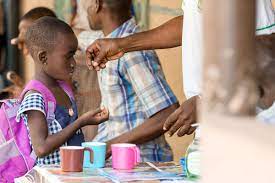A new study, led by the University of Michigan, has concluded that large-scale, government-funded child cash transfer programs can significantly improve child health and development across the globe. Analyzing data from over 140 countries, the research highlights the powerful impact of such programs on children’s well-being, offering nations a cost-effective strategy for improving public health and driving future economic growth.
The study, published this month in The Lancet, is based on the work of Luke Shaefer, faculty director of U-M’s Poverty Solutions and a professor of social work and public policy. According to Shaefer, child cash transfer programs are an evidence-based solution that many countries are already using with great success.
“These programs are not just ideas that need testing,” Shaefer said. “Countries have seen positive outcomes for over a decade, including in the U.S., where the expanded Child Tax Credit helped reduce child poverty to a historic low.”
Shaefer and his colleagues examined both low- and high-income countries with child cash transfer programs, finding that these initiatives consistently lead to improvements in several key areas. Benefits include increased household income, decreased income instability, and better access to housing and food security. Families participating in these programs also report lower stress levels and higher engagement with children, contributing to improved cognitive and emotional development.
The research further found that children in poverty, who are often exposed to adversity and lack adequate healthcare, can experience better health outcomes with financial support. Healthier children are better equipped to thrive academically and professionally, creating long-term benefits for both public health and economic stability.
One notable example of a successful child cash transfer program in the U.S. is the expanded Child Tax Credit, which was temporarily introduced in 2021. This policy helped slash child poverty rates to a historic low of 5.2%. Though the expanded CTC expired, state and local governments continue to advocate for similar initiatives.
Building on these findings, Shaefer and Mona Hanna from Michigan State University launched the Rx Kids program in Flint, Michigan, this year. The program provides no-strings-attached cash to pregnant mothers—$1,500 during pregnancy and $500 monthly during the baby’s first year. More than 1,200 families are enrolled in Rx Kids, with projections showing $5 million in cash distributed by the end of 2024. Early results suggest improvements in housing stability, food security, and maternal mental health, including a reduction in postpartum depression.
In 2025, the Rx Kids program is set to expand to Kalamazoo, Michigan, with plans to grow nationwide. The program aims to become a model for similar child cash transfer policies across the U.S.
Shaefer and his team argue that universal child cash transfer programs represent a critical investment in the health and development of future generations. UNICEF has long called unconditional child benefits a “foundational policy” for child social development, and the study affirms their importance in shaping healthier, more prosperous societies.
The research was co-authored by experts from Columbia University, UNICEF Innocenti Global Office of Research and Foresight, the Learning for Well-being Institute, and GiveDirectly in Uganda. Their findings underscore the importance of child cash benefits in the global effort to improve children’s health, reduce poverty, and strengthen economies.
For more information, read the full study in The Lancet at DOI: 10.1016/S0140-6736(24)02366-3.












